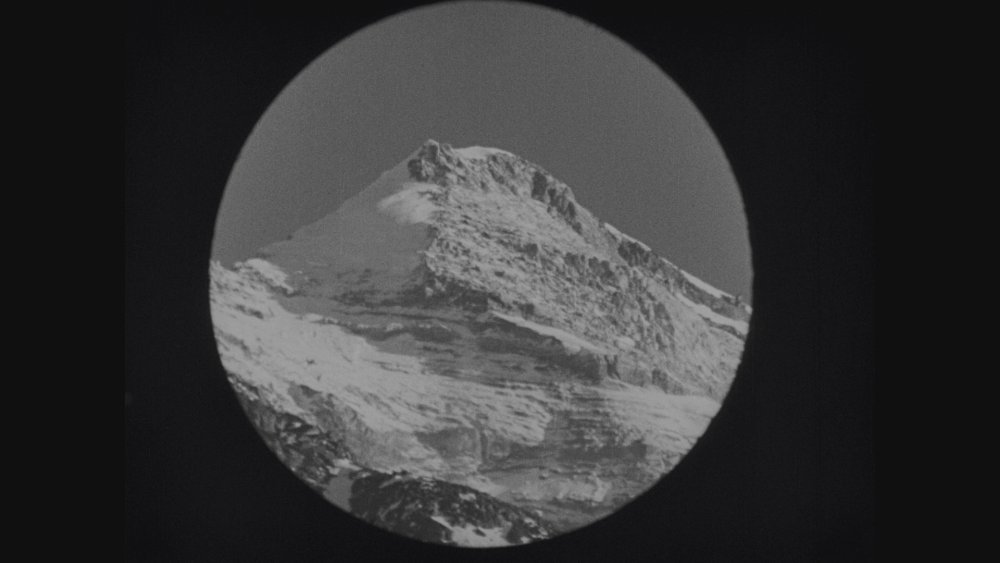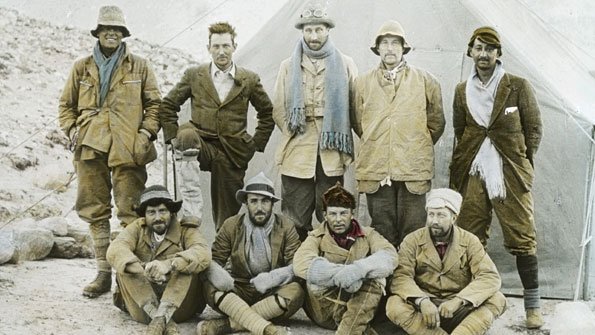| The 57th BFI London Film Festival in partnership with American Express run from 9-20 October 2013. |
The BFI National Archive’s gala screening in the 57th BFI London Film Festival in partnership with American Express is today officially announced as the world premiere of the newly restored official film record of the legendary 1924 Everest expedition, The Epic of Everest, directed by Captain John Noel. Screening at the Odeon West End cinema on the evening of 18 October 2013 in London’s Leicester Square, the film will have a remarkable new score performed live by composer Simon Fisher Turner and a specially created musical ensemble.
This record of the third attempt to climb Everest is one of the most remarkable films in the BFI National Archive and the film will be released in cinemas across the UK coinciding with its LFF premiere.
Robin Baker, Head Curator, BFI National Archive said:
This is one of the greatest treasures of the BFI National Archive. It represents a key moment in the history of mountaineering and remains an enduring monument to Mallory and Irvine. This film is a precious record of endurance and is a powerful piece of cinema now beautifully restored to show how Everest was so nearly conquered. It is highly appropriate to present the film now, just sixty years since Everest was finally conquered by a British expedition and one hundred years since Captain John Noel, the film’s director, first set eyes on the mountain itself.

The 1924 Everest expedition culminated in the deaths of two of the finest climbers of their generation, George Mallory and Andrew Irvine, and sparked an ongoing debate over whether or not they did indeed reach the summit.
Filming in brutally harsh conditions with a specially adapted camera, Captain John Noel captured images of breathtaking beauty and considerable historic significance. The film is also among the earliest filmed records of life in Tibet and features sequences at Phari Dzong (Pagri), Shekar Dzong (Xegar) and Rongbuk monastery. But what resonates so deeply is Noel’s ability to frame the vulnerability, isolation and courage of people persevering in one of the world’s harshest landscapes.
The restoration by the BFI National Archive has transformed the quality of the surviving elements of the film and reintroduced the original coloured tints and tones. Revealed by the restoration, few images in cinema are as epic – or moving – as the final shots of a blood red sunset over the Himalayas. BFI National Archive experts have gone back to the earliest surviving elements donated to the BFI in the 1960s. The BFI has worked closely with Captain Noel’s daughter, Sandra Noel, to review the surviving materials. Before his death in 1989 Captain Noel had been in correspondence with the BFI about creating a definitive version of his film.

The Epic of Everest (1924)
Captain Noel was a heroic, pioneering explorer who had reconnoitred the mountain in disguise while on leave from his Indian regiment, as early as 1913. In 1919, in the course of a paper to the Royal Geographical Society, Noel made the first public suggestion that Mount Everest should be climbed, a challenge taken up in 1920 when members of the Royal Geographical Society and the Alpine Club of Great Britain formed the Mount Everest Committee.
The first reconnaissance trip was undertaken in 1921 and no moving images are known to exist. The second Everest expedition took place in 1922 and Captain John Noel took the first ever film of the mountain, which is also the first ever film shot in Tibet. For the third Everest expedition, in 1924, Noel bought the rights to all still photography and moving image material and was himself the official cameraman.
The film will have a newly commissioned score by composer Simon Fisher Turner combining electronic music, found sounds, western and Nepalese instruments and vocals and it will be performed live by the composer with specially assembled musicians.
Restoration supported by The Eric Anker-Petersen Charity.







